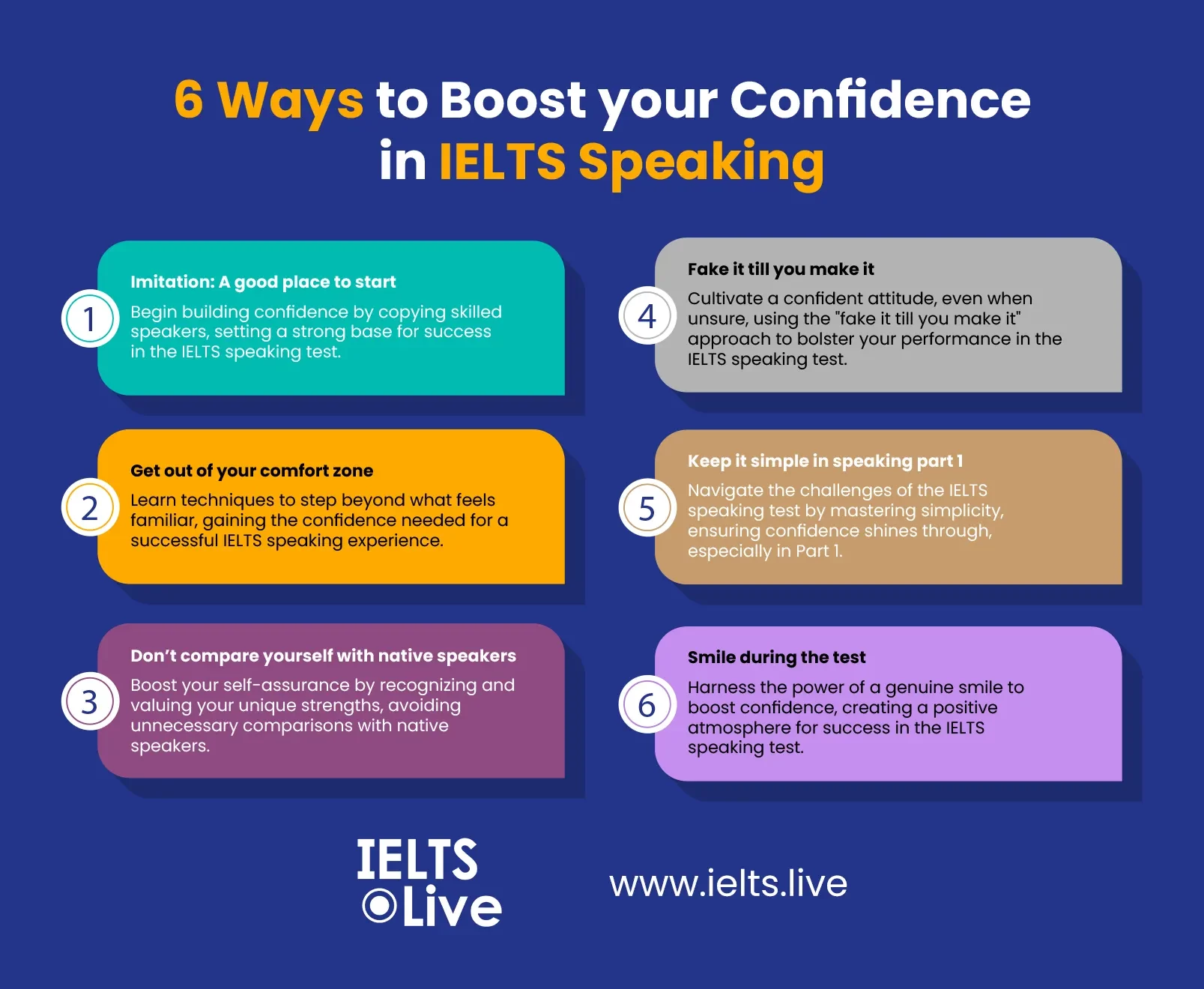
When you're preparing for the IELTS speaking test, overcoming nervousness and building confidence are critical to success. In this guide, we'll explore a set of practical techniques designed to ease your nerves and boost your self-confidence.
Imitation: A good place to start
When it comes to learning a new language, mimicry can be a useful strategy. You may improve your pronunciation, intonation, and general fluency by imitating native English speakers. Watching films, TV episodes, or videos with English subtitles is an excellent method to become acquainted with and learn from native speakers.
For example, let's say you're watching a popular English TV series. Take note of how the characters speak and try to imitate their accents and speaking patterns. Practise speaking aloud while copying the tone and rhythm of the native speakers on the show. This exercise will help you become more familiar with the sounds and flow of English, which will help you do better in the IELTS Speaking Test.
You may also like: Revolutionize Your IELTS Speaking Test: The Unconventional Strategies That Guarantee Success!
Another useful way is to listen to podcasts or audio recordings of native English speakers. Choose a certain podcast host or speaker whose tone and mannerisms you enjoy. Imitate their speech patterns, intonation, and rhythm as best you can.
Remember that the purpose of imitation is to acquire confidence and enhance your general speaking skills, not to become an exact clone of a native speaker. It's a first step towards discovering your own voice and developing your own distinctive English-speaking style.
Get out of your comfort zone
Pushing yourself outside of your comfort zone is critical for establishing confidence and enhancing your speaking skills in the IELTS Speaking Test. It's natural to be anxious or apprehensive about speaking in a foreign language, but by taking steps ahead to push yourself, you can overcome such barriers and do better on the test.
Seeking out opportunities to converse with native English speakers is a great approach to pushing your comfort zone. This could include participating in language exchange programmes, attending social events, or joining English-speaking clubs or discussion groups. Although it may appear frightening at first, keep in mind that everyone is there to learn and improve their language abilities. Here are some useful tips to help you get out of your comfort zone:
- Begin with simple chats and work your way up.
- Look for native English speakers or language partners to practise with on a regular basis.
- Participate in English-speaking clubs or language exchange programmes to become immersed in dialogues.
- Experiment with more advanced listening and reading materials.
- Accept mistakes as learning experiences, and don't be scared to make them.
And lastly, remember that growth happens outside of your comfort zone. So embrace the discomfort and watch yourself bloom.
Don’t compare yourself with native speakers
Many IELTS test candidates fall into the trap of comparing themselves to native English speakers. You should know that the IELTS Speaking Test evaluates your language competency rather than your ability to speak like a native speaker. Even your accent doesn’t matter as long as it's understandable. When you compare yourself to native speakers, you may lose confidence. So, instead, concentrate on your own growth and development. Here are a few reasons why you are not to compare yourself to native speakers of English,
- Different backgrounds and experiences: Native English speakers have an inherent advantage because they have spent their entire childhood exposed to the language. They have a stronger knowledge of cultural nuances because they have been surrounded by the language since they were young. Keep in mind that each person's experience learning a language is different and that each person's efforts should be acknowledged and celebrated. Think of a situation where you are speaking in the IELTS Speaking Test about a subject relating to cultural norms. While a native speaker may have direct knowledge, you can provide insights from your own cultural background which makes your perspective equally relevant. Accept the diversity you bring to the table because it makes your responses more interesting.
- Proficiency vs. fluency: The IELTS Speaking Test assesses language proficiency, including the ability to communicate ideas using appropriate vocabulary and construct sentences using proper grammar. On the other hand, fluency involves fluid, assured speech that gets better with practice. The major purpose of the test is not to achieve native-like fluency, so don't be disheartened if you don't sound like a native speaker. Instead of perfect fluency, concentrate on effective communication.
- Language Diversity Is Valued: The IELTS Speaking Test is conducted all around the world and evaluates applicants from a variety of linguistic backgrounds. The test values and acknowledges the diversity of English speakers around the world. Your distinctive accent, cultural background, and language development are advantages that add to the diversity of English communication around the world.

Fake it till you make it
In the IELTS Speaking Test, confidence is necessary, and occasionally you may need to "fake it till you make it." You can favourably affect your own perspective and increase your confidence during the test by speaking with conviction, displaying confident body language, and maintaining eye contact. The "fake it till you make it" philosophy may help you in projecting confidence in the following ways:
- Positive Body Language: Your body language speaks volumes. You can convey confidence by standing tall, keeping an open posture, and avoiding tense body language (such as fidgeting or crossing your arms). Consider the scenario where you are given a difficult question during the speaking test. Instead of slouching or appearing tense, sit up straight, lean slightly forward, and keep your posture relaxed but focused. These will make you feel more in control.
- Speaking with Conviction: The tone of your voice and the conviction in your words are two ways to show that you are speaking with confidence. Speaking with confidence and clarity, emphasise key points. Avoid hesitating or rambling when answering questions, even if you have some doubts. Use fillers, such as "Well, I believe..." or "From my perspective..." to show that you are confident in your assertions. By displaying confidence in your voice, you will not only persuade the examiner but also enhance your own self-confidence.
- Visualisation technique: Visualisation is a potent tool for increasing confidence. Spend a moment visualising yourself speaking clearly and with confidence before the test. Imagine answering questions correctly and getting praised for your responses. Just keep in mind that having confidence isn't about trying to be someone you're not; rather, it's about presenting your best self.
Keep it simple in speaking part 1
The goal of the IELTS Speaking Part 1 is to assess your ability to chat on common topics. Keeping things simple will significantly improve your performance and give you more confidence. Here are some tips to excel in Speaking Part 1:
- Listen attentively: Make sure you fully comprehend the questions asked by the examiner. Before responding, pause for a moment to gather your thoughts. This indicates your focus and enables you to respond with pertinent information.
For instance, if the interviewer asks about your favourite hobby, pay close attention to what they want to know specifically. Give a clear, concise response that shows your passion for the hobby.
- Give Brief and Clear Answers: In Speaking Part 1, the questions are usually simple and call for brief answers. Avoid making your responses too complicated or going off-topic. For example, if asked about your hometown, provide a quick explanation of its geography, noteworthy monuments, or cultural significance. Remember, the purpose is to present a concise overview of the subject without going into too much detail.
- Use Common Language: Unless you are comfortable using complicated language or intricate sentence patterns, stay away from them. Stick to words and phrases that you are familiar with and that accurately represent your ideas.
Smile during the test
Smiling is an effective tool that can have a major impact on your overall presentation and confidence throughout the IELTS Speaking Test. A sincere smile can improve the atmosphere, build rapport with the examiner, and increase your own self-confidence. Here's why it's important to smile during the test:
- Establishes a Positive Connection: By smiling warmly as you approach the speaking test room, you make a good first impression. Smiling makes the ambience more pleasant and cordial, which can put you at ease.
- Relaxes Anxiety: A smile has a relaxing, natural effect on the body. When you smile, endorphins are released, which assist relieve stress and anxiety. You can reduce stress and boost your general confidence by consciously smiling throughout the exam.
That will be all for this blog. Hopefully, this was helpful to you. I wish you the best in your IELTS journey.
Good luck!







0 COMMENTS